-

人教A版高中数学必修一对数的运算教学设计(1)
本节课是新版教材人教A版普通高中课程标准实验教科书数学必修1第四章第4.3.2节《对数的运算》。其核心是弄清楚对数的定义,掌握对数的运算性质,理解它的关键就是通过实例使学生认识对数式与指数式的关系,分析得出对数的概念及对数式与指数式的 互化,通过实例推导对数的运算性质。由于它还与后续很多内容,比如对数函数及其性质,这也是高考必考内容之一,所以在本学科有着很重要的地位。解决重点的关键是抓住对数的概念、并让学生掌握对数式与指数式的互化;通过实例推导对数的运算性质,让学生准确地运用对数运算性质进行运算,学会运用换底公式。培养学生数学运算、数学抽象、逻辑推理和数学建模的核心素养。1、理解对数的概念,能进行指数式与对数式的互化;2、了解常用对数与自然对数的意义,理解对数恒等式并能运用于有关对数计算。
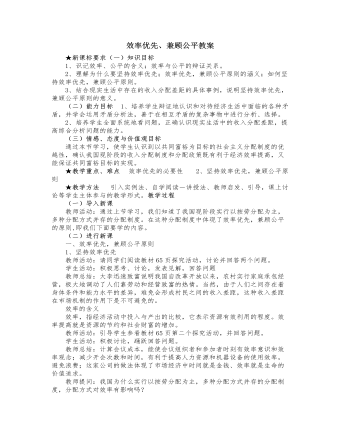
人教版高中政治必修1效率优先、兼顾公平教案
教师活动:引导学生阅读教材67页,回答:什么是效率优先,兼顾公平?如何贯彻此原则?学生活动:阅读课本,认真总结,发表见解教师点评:效率优先,实质是发展生产力优先,分配制度和分配政策要以促进生产力的发展和经济效益的提高为首要目标;兼顾公平,是指社会要将收入差距控制在合理的范围内,使分配的结果能促使人们奋进,社会具有生机喝活力。坚持效率优先、兼顾公平,首先,要允许和鼓励一部分地区和个人通过诚实劳动和合法经营先富起来,先富带后富,最终达到共同富裕。其次,既要反对平均主义,又要防止收入差距悬殊;既要落实分配政策,又要提倡奉献精神。再次,必须正确处理初次分配注重效率与再分配注重公平的关系。初次分配注重效率有利于充分调动人们的积极性。在再分配中,要加强政府对收入分配的调节,调节过高收入,取缔非法收入,提高低收入者的收入水平,通过完善社会保障制度等,把收入差距控制在一定范围之内。

新人教版高中英语必修1Unit 1 Teenage Life-Listening and Speaking & Listening and Talking教案
Step 2 Listening and Talking1. The teacher is advised to talk with their new students about the related topic: Boys and girls, do you know some structures to talk about future activities? Talking about future activitiesWe’ll …I plan to …There’ll be …I hope to …We’re going to …2. After their small talk, the teacher can move on by playing the listening and solve the following task.Underline the expressions in the sentences below Cao Jing and Max use to talk about the future.We’ll learn useful skills.I plan to improve my spoken English.There’ll be students from different schools.I hope to make new friends.We’ll talk about teenage life.I’ll learn to make a fire.There’ll be students from different countries at the camp.There’ll be some experts there to show us how to live in the wild.We’re going to learn about wildlife.I’m going to give a speech.I think I’m going to enjoy the activities.I think we’ll have a lot of fun.3. Work in groups. Plan a youth camp.Teacher make the Ss think of ideas for the camp. And they can use the questions below to get started. And have the Ss present their ideas for a youth camp to the class.●What kind of camp is it?●Who will be there?●What will they do?●What will they learn?

新人教版高中英语必修1Unit 2 Travelling Around-Listening and Speaking & Listening and Talking教案
【教学目标与核心素养】1. Instruct students to get main facts by listening and motivate them to talk about the topics about how to prepare for the trip and make reservations by listening and ultimately can make travel arrangements and reservations. 2. Develop students’ sense of cooperative learning and individual thinking capability. 3. Develop students’ different listening skills to solve different listening comprehensive problems.4. Help students to understand how to use the structures “the present continuous tense (be doing) is used to express future plans.【教学重难点】1. Teach students how to focus on key words, not on single words or grammar.2. Prompt Ss to talk about the related topics, such as how to prepare for the trip and make a travel plan.【教学过程】Step 1: Listening and SpeakingLead inThe teacher is advised to talk with their students about the places that they want to travel most both at home and abroad: boys and girls, if you have a chance to travel around the world, where will you go? After their small talk, the teacher can move on by finishing the following listening task:Before travelling, what do we need to prepare for the trip?

新人教版高中英语必修1Unit 3 Sports and Fitness-Listening and Speaking & Listening and Talking教案
Finally, after finishing the task above, the teacher is expected to instruct students to work in groups to finish the following project:Speaking ProjectWhat event or activity would you like to invite your friend to? Make a conversation with a partner.Ski Race: Zhangjiakou, a beautiful city in northern China, will host the Youth Ski Race in December.Track Meet: a great event for track –and –field lovers on 26 October.Gym Class: come and work out at a gym! You can make it.Part 2: Listening and Talking:The teacher is advised to talk with their new students about the related topic: Boys and girls , what do you think of sportsmanship? Let’s listen and find out:Play the listening and match each opinion with the right speaker. Who do you agree with? Why?Cao Jing _____________ Lily _____________ Max _____________A. An athlete should do his/her best to win.B. The girl should stop and help the other girl. Good sportsmanship is more important than wining!C. An athlete should think about honor and his/her fans if he/she is competing for his/her country.Listen again and circle the expressions that you hear in the conversation.

新人教版高中英语必修1Unit 3 Sports and Fitness- Discovering Useful Structures—tag questions教案
【教材分析】This teaching period mainly deals with the grammar: tag questions.This period carries a considerable significance to the cultivation of students’ spoken English. The teacher is expected to enable students to master this period thoroughly and consolidate the knowledge by doing some exercise of good quality.【教学目标与核心素养】1. Get students to have a good understanding of the basic usages of tag questions.2. Enable students to use the basic phrases structures flexibly.3. Develop students’ speaking and cooperating abilities.4. Strengthen students’ great interest in grammar learning.【教学重难点】1. How to enable students to have a good understanding of the basic usages of tag questions.2. How to enable students to use the basic usages of tag questions flexibly.【教学过程】Step1: 语法自主探究一、基本组成方法1.肯定式陈述部分+否定附加疑问部分(前肯后否) You often play badminton, don’t you? 你经常打羽毛球,是吗?You are going to the gym with me, aren’t you?你要和我一起去健身房,是吗?She’s been to shanghai before, hasn’t she? 她以前去过上海,是吗?2.否定式陈述部分+肯定附加疑问部分(前否后肯) It isn't a beautiful flower, is it? 那不是美丽的花,是吗?You didn't go skating yesterday, did you? 你昨天没去滑冰,是吗?They can’t finish it by Friday, can they?他们不能在星期五之前完成,是吗?

新人教版高中英语必修3Unit 1 Festivals and celebrations-Discovering Useful Structure教学设计
4.That was an experience that frightened everyone. →That was _____________________. 答案:1. taking 2. being discussed 3. in the reading room 4. a frightening experienceStep 6 The meaning and function of V-ing as the predicative动词-ing形式作表语,它通常位于系动词后面,用以说明主语“是什么”或“怎么样”一种表示主语的特质、特征和状态, 其作用相当于形容词; 另一种具体说明主语的内容, 即主语等同于表语, 两者可互换。The music they are playing sounds so exciting. 他们演奏的音乐听起来令人激动。The result is disappointing. 结果令人失望。Our job is playing all kinds of music. 我们的工作就是演奏各种音乐。Seeing is believing. 眼见为实。Step 7 Practice1. It is ________(amaze) that the boy is able to solve the problem so quickly.2. Buying a car is simply _______(waste) money. 3. Please stop making the noise—it’s getting ________(annoy). 4. complete the passage with the appropriate -ing form.La Tomatina is a festival that takes place in the Spanish town Bunol every August. I think many food festivals are __________ because people are just eating. however, this festival is _________ because people don't actually eat the tomatoes. Instead, they throw them at each other! the number of people ________ part in this tomato fight, can reach up to 20,000, and it is a very __________ fight that lasts for a whole hour. The _______ thing is how clean Bunol is after the tomatoes are washed away after the fight. this is because the juice form tomatoes is really good for making surfaces clean!答案:1. amazing 2. wasting 3. annoying4. boring interesting taking exciting amazing

新人教版高中英语必修3Unit 1 Festivals and Celebrations-Reading and Thinking教学设计
The topic of this part is “Discover the reasons for festivals and celebrations.The Listening & Speaking & Talking part aims at talking about the experiences and feelings or emotions about the festivals and celebrations. This section aims at detecting the reason why the people celebrate the festivals, the time, the places, the types and the way of celebrations. It also explains why some traditions in the old celebrations are disappearing, like the firecrackers in the big cities and some new things are appearing like the prosperity of business or commerce. 1. Students can talk about what festivals they know and the reasons and the way of celebrating them.2. Students should learn the reading skills such as the headline and get the topic sentences, the structures of articles.3. Students can understand the past, the present situation of some festival around the world and why there are some changes about them. 4. Students can have the international awareness about the festivals.1. Students should learn the reading skills such as the headline and get the topic sentences, the structures of articles.2. Students can understand the past, the present situation of some festival around the world and why there are some changes about them.Step 1 Lead in---Small talkWhat festival do you like best ? Why ?I like the Spring Festivals because I can set off the fireworks, receive the lucky money and enjoy the Gala with my families.Step 2 Before reading---Pair workWhy do people celebrate different festivals ?The Spring Festivals is to celebrate the end of winter and the coming of spring and new life.The Mid-autumn Day is to celebrate the harvest and admire the moon.

新人教版高中英语必修3Unit 1 Festivals and Celebrations-Reading for writing教学设计二
Step 3 Analyzing article structureActivity 31. Teachers raise questions to guide students to analyze the chapter structure of this diary and think about how to describe the festival experience. (1)What should be included in the opening/body/closing paragraph(s)?(2)How did the writer arrange his/her ideas?(3)What kind of interesting details did the writer describe?(4)How did the writer describe his/her feelings/emotions during the event?2. Students read and compare the three sentence patterns in activity 2. Try to rewrite the first paragraph of the diary with these three sentence patterns. After that, students exchange corrections with their partners. Such as:●This was my first time spending three days experiencing the Naadam Festival in China’s Inner Mongolia Autonomous Region and it was an enjoyable and exciting experience. ●I'll never forget my experience at the Naadam Festival because it was my first time to watch the exciting Mongolian games of horse racing, wrestling, and archery so closely. ●I'll always remember my first experience at the Naadam Festival in China’s Inner Mongolia Autonomous Region because it was so amazing to spend three days witnessing a grand Mongolian ceremony. Step 4 Accumulation of statementsActivity 41. Ask the students to read the diary again. Look for sentences that express feelings and emotions, especially those with the -ing form and the past participle. Such as:● …horse racing, wrestling, and archery, which are all so exciting to watch. ● some amazing performances● I was surprised to see…● I was a little worried about. . . ● feeling really tiredOther emotional statements:●I absolutely enjoyed the archery, too, but the horse races were my favourite part. ●I'm finally back home now, feeling really tired, but celebrating Naadam with my friend was totally worth it. ●He invited me back for the winter to stay in a traditional Mongolian tent and cat hot pot. I can’t wait!2. In addition to the use of the -ing form and the past participle, the teacher should guide the students in the appreciation of these statements, ask them to memorize them, and encourage them to use them reasonably in writing practice.

新人教版高中英语必修3Unit 1 Festivals and Celebrations-Reading for Writing教学设计一
The topic of this part is “Write about your festival experience”.During the Listening and Speaking and Talking, students are just asked to say out their festival experiences such as the Spring Festival, Mid-autumn Day, but this part students will be asked to write down their own festival experiences. During the reading part, it introduces the Naadam Festival in Inner Mongolia Autonomous Region, which can give students a good example to imitate. Students not only learn the festival, but touch and feel the Inner Mongolian’s character, the spirit and cultural atmosphere, which can help students form the cultural awareness and learn to enjoy and value the diversity of Chinese culture.Concretely, the dairy tells the experience that the author spent the Naadam Festival in Inner Mongolia Autonomous Region with his/her friend. The structure is clear. In the opening paragraph, it introduces the topic of the Naadam Festival and the whole feeling. Then it introduces the items of the festival like the ceremony, wrestling and horse racing. Finally, it summarizes this experience. Because this part is a travel journal, we must guide students pay more attention to these details: 1. use the first person. 2. use the past tense to tell the past thing and use the present or future tense to describe the scenery. 3. use the timeline to tell the development. 4. be careful for the author’s psychology, emotion and feeling, etc.1. Read quickly to get main idea; read carefully to get the detailed information about Naadam Festival.2. Learn the structure of the reading article and language.3. Write an article about a festival experience4. Learn to use the psychology, emotions and feeling in the writing.1. Write an article about a festival experience.2. Use the structure of the reading article and language.

新人教版高中英语必修3Unit 1 Festivals and Celebrations-Listening &Speaking&Talking教学设计
The theme of this section is “Talk about festival activities and festival experiences”.Festival and holiday is a relaxing and interesting topic for students. This part talks about the topic from the daily life of students’. In the part A ---Listening and Speaking, there are three conversations among different speakers from three countries(Japan, Rio and China), where the speakers are participating in or going to participate in the festivals and celebrations. So listening for the relationship among them is a fundamental task. Actually, with the globalization and more international communication, it is normal for Chinese or foreigners to witness different festivals and celebrations in or out of China. In the Conversation 1, a foreign reporter is interviewing a Japanese young girl who just had participated in the ceremony of the Coming-of-Age Day on the street and asking her feeling about the ceremony and the afterwards activities. Conversation 2, Chinese girl Li Mei is witnessing the Rio Carnival for the first time, and her friend Carla gives her some advice on the costumes which enables her to match with the carnival to have a good time. Conversation 3, a Chinese guide is showing a group of foreign visitors around the Lantern Festival and introducing the customs of the festival to them. The three conversations have a strong vitality and insert the festival and cultural elements from different countries. So perceiving the festivals and cultures from different countries is the second task. At the same time, the scripts also insert the targeted grammar --- v-ing as attributive and predicative, which students can perceive and experience in a real context and make a road for the further study. That is the third task. In the Part B--- Listening and Talking, the theme is “Talk about festival experience”, which is the common topic in our daily conversations. During the conversation, Song Lin, a Chinese student, asked Canadian friend Max about how to spend Christmas. In the conversation, Song Lin talked about experience and the feelings during the Chinese Spring Festival, during which there are not only some enjoyable things but some unpleasant things. After the listening, perhaps students find there are some similarities between Christmas and the Chinese Spring Festival as there are some differences in the origins and celebrations. For example, people always visit friends and relatives, decorate their houses, have a big dinner together, chat and give presents to each other.
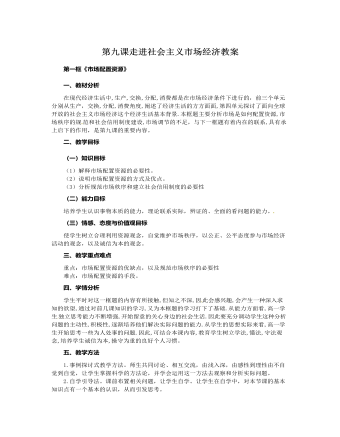
人教版高中政治必修1第九课走进社会主义市场经济教案
法律手段:制定和运用经济法规,包括经济立法、经济司法活动等行政手段:采取强制性的行政命令、指示、规定等运用举例:我国一些地区遭遇突如其来的“禽流感”,禽类养殖户损失惨重。国家采取了对疫区封锁,对疫区的养殖户进行经济补贴,以及国家出资统一对疫区进行消毒等措施进行防治,并规定任何人不得将家禽带出疫区,违者追究法律责任。请结合材料说明在防治“禽流感”、发展禽类养殖的过程中,我国政府分别采取了哪些措施教师分析:对疫区养殖户进行经济补贴体现经济手段;对违反规定者追究法律责任,体现法律手段;对疫区进行封锁体现行政手段。(四)反思总结,当堂检测。教师组织学生反思本节课的主要内容(参照板书),进行总结。设计意图:对本节课的内容进行小结,学生的概括过程也是检验学生对本节课理解程度的过程。再次明确学生是学习的主体,并能够发现,问题解决问题。
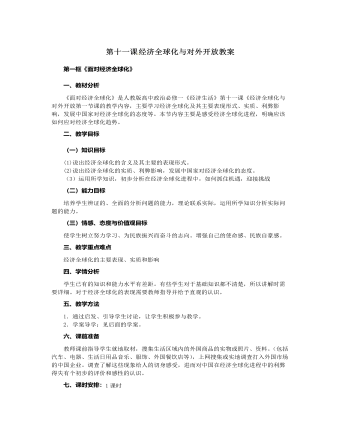
人教版高中政治必修1第十一课 经济全球化与对外开放教案
材料说明了什么?探究二:材料分析:2005年12月13日至18日,WTO第六次部长级会议在香港召开。会议经过谈判通过了《部长宣言》,规定发达成员和部分发展中成员2008年前向最不发达国家所有产品提供免关税、免配额的市场准入;发达成员2006年取消棉花的出口补贴, 2013年年底前取消所有形式农产品出口补贴。材料体现了世界贸易组织在国际经济贸易领域中发挥哪些作用?探究三:P97:A、这些图示,反映出我国利用外资哪些特点?。B、能为我国提高外资利用水平提出些建议吗?探究四:材料展示:我国是人口众多的发展中大国,全国居民每天消费总额达到37亿元。每天消费粮食75万吨,相当于一个县级商品粮基地的全年产量;每天消耗猪肉6万吨,食油1万吨,糖1.6万吨,鲜蛋1.8万吨。每天购买杂志600多万册,报纸5000多万份,需要400量中型载货汽车才能装载。
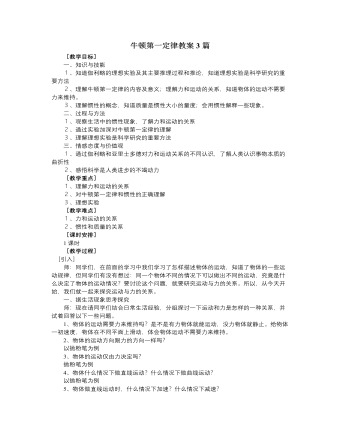
人教版新课标高中物理必修1牛顿第一定律教案3篇
一、知识与技能1、知道伽利略的理想实验及其主要推理过程和推论,知道理想实验是科学研究的重要方法2、理解牛顿第一定律的内容及意义;理解力和运动的关系,知道物体的运动不需要力来维持。3、理解惯性的概念,知道质量是惯性大小的量度;会用惯性解释一些现象。二、过程与方法1、观察生活中的惯性现象,了解力和运动的关系2、通过实验加深对牛顿第一定律的理解3、理解理想实验是科学研究的重要方法三、情感态度与价值观1、通过伽利略和亚里士多德对力和运动关系的不同认识,了解人类认识事物本质的曲折性2、感悟科学是人类进步的不竭动力[教学重点]1、理解力和运动的关系2、对牛顿第一定律和惯性的正确理解3、理想实验[教学难点]1、力和运动的关系2、惯性和质量的关系[课时安排]1课时[教学过程][引入]
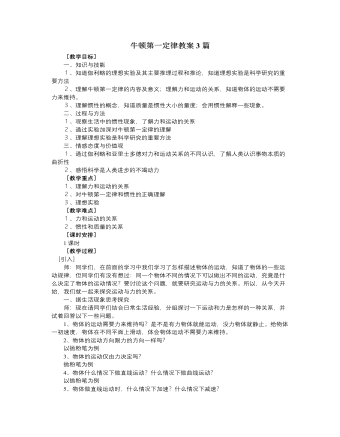
人教版新课标高中物理必修1牛顿第一定律教案3篇
一、知识与技能1、知道伽利略的理想实验及其主要推理过程和推论,知道理想实验是科学研究的重要方法2、理解牛顿第一定律的内容及意义;理解力和运动的关系,知道物体的运动不需要力来维持。3、理解惯性的概念,知道质量是惯性大小的量度;会用惯性解释一些现象。二、过程与方法1、观察生活中的惯性现象,了解力和运动的关系2、通过实验加深对牛顿第一定律的理解3、理解理想实验是科学研究的重要方法三、情感态度与价值观1、通过伽利略和亚里士多德对力和运动关系的不同认识,了解人类认识事物本质的曲折性2、感悟科学是人类进步的不竭动力[教学重点]1、理解力和运动的关系2、对牛顿第一定律和惯性的正确理解3、理想实验[教学难点]1、力和运动的关系2、惯性和质量的关系
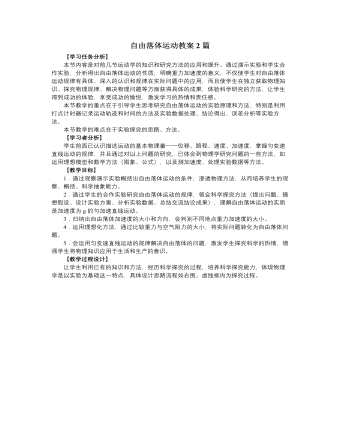
人教版新课标高中物理必修1自由落体运动教案2篇
教学重点1.自由落体运动的概念及探究自由落体运动的过程。2.掌握自由落体运动规律,并能运用其解决实际问题。教学难点演示实验和探究实验的技巧及自由落体运动规律的得出.教学过程设计思想:1、 先用游戏激发学生学习兴趣,顺理成章地研究落体运动;2、 通过演示实验让学生自己总结出物体下落快慢不同的主要原因是空气阻力,从而猜想若没有空气阻力会怎样;3、 用牛顿管实验验证猜想,引入了新的理想运动模型:自由落体运动。讲述1971年宇航员做的实验,加深印象;4、 了解地球表面物体下落运动近似成自由落体运动的条件;5、 着手研究自由落体运动的规律,利用打点计时器进行研究,得到结论;6、 总结自由落体运动特点及重力加速度;7、 应用训练
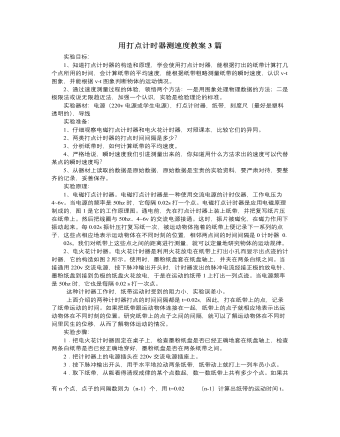
人教版新课标高中物理必修1用打点计时器测速度教案3篇
实验目标:1、知道打点计时器的构造和原理,学会使用打点计时器,能根据打出的纸带计算打几个点所用的时间,会计算纸带的平均速度,能根据纸带粗略测量纸带的瞬时速度,认识v-t图象,并能根据v-t图象判断物体的运动情况。2、通过速度测量过程的体验,领悟两个方法:一是用图象处理物理数据的方法;二是极限法或说无限趋近法,加强一个认识,实验是检验理论的标准。实验器材:电源(220v电源或学生电源),打点计时器,纸带,刻度尺(最好是塑料透明的),导线实验准备:1、仔细观察电磁打点计时器和电火花计时器,对照课本,比较它们的异同。2、两类打点计时器的打点时间间隔是多少?3、分析纸带时,如何计算纸带的平均速度。4、严格地说,瞬时速度我们引进测量出来的,你知道用什么方法求出的速度可以代替某点的瞬时速度吗?
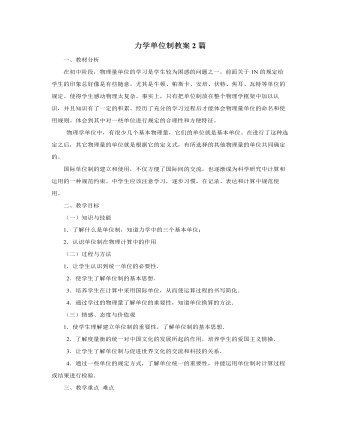
人教版新课标高中物理必修1力学单位制教案2篇
一、教材分析在初中阶段,物理量单位的学习是学生较为困惑的问题之一。前面关于1N的规定给学生的印象总好像是有些随意。尤其是牛顿、帕斯卡、安培、伏特、焦耳、瓦特等单位的规定。使得学生感动物理太复杂。事实上,只有把单位制放在整个物理学框架中加以认识,并且知识有了一定的积累。经历了充分的学习过程后才能体会物理量单位的命名和使用规则。体会到其中对一些单位进行规定的合理性和方便特征。物理学单位中,有很少几个基本物理量,它们的单位就是基本单位。在进行了这种选定之后,其它物理量的单位就是根据它的定义式,有所选择的其他物理量的单位共同确定的。国际单位制的建立和使用,不仅方便了国际间的交流,也逐渐成为科学研究中计算和运用的一种规范约束。中学生应该注意学习,逐步习惯,在记录、表达和计算中规范使用。二、教学目标(一)知识与技能1.了解什么是单位制,知道力学中的三个基本单位;2.认识单位制在物理计算中的作用
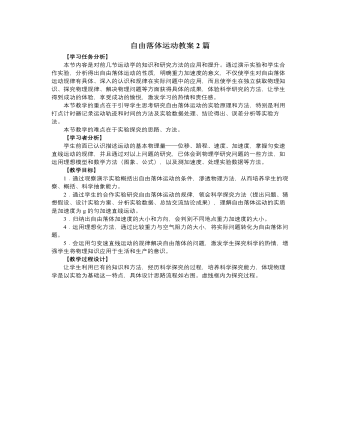
人教版新课标高中物理必修1自由落体运动教案2篇
演示实验1、将一张纸和一张金属片在同一高度同时释放,结果金属片先着地。教师不发表意见,继续做实验。分别将实验内容和实验结果板书在黑板上。2、将刚才的纸片紧紧捏成一团,再次与硬币同时释放,结果两者几乎同时落地。3、将两个完全一样的纸片,一个捏成团,一个平展,则纸团下落快。师:物体下落快慢是由质量决定吗?生:不是的!师:为什么这样说?生:第2个实验和第三实验都说明了这个问题,特别是第3个问题,质量一样却下落有快慢之分。师:那你现在觉得物体下落快慢由什么因素决定呢?生:我想应该是空气阻力。猜想师:如果影响物体下落快慢的因素是空气阻力,那么在没有空气阻力,物体的下落快慢应该是一样的,这种猜想是不是正确呢?我们来做一个实验验证一下。
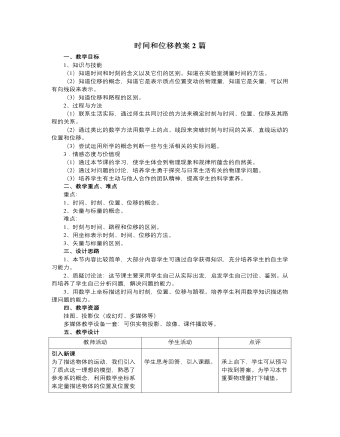
人教版新课标高中物理必修1时间和位移教案2篇
一、教学目标1、知识与技能(1)知道时间和时刻的含义以及它们的区别。知道在实验室测量时间的方法。(2)知道位移的概念,知道它是表示质点位置变动的物理量,知道它是矢量,可以用有向线段来表示。(3)知道位移和路程的区别。2、过程与方法(1)联系生活实际,通过师生共同讨论的方法来确定时刻与时间、位置、位移及其路程的关系。(2)通过类比的数学方法用数学上的点、线段来突破时刻与时间的关系,直线运动的位置和位移。(3)尝试运用所学的概念判断一些与生活相关的实际问题。3.情感态度与价值观(1)通过本节课的学习,使学生体会到物理现象和规律所蕴含的自然美。(2)通过对问题的讨论,培养学生勇于探究与日常生活有关的物理学问题。(3)培养学生有主动与他人合作的团队精神,提高学生的科学素养。二、教学重点、难点重点:1、时间、时刻、位置、位移的概念。2、矢量与标量的概念。